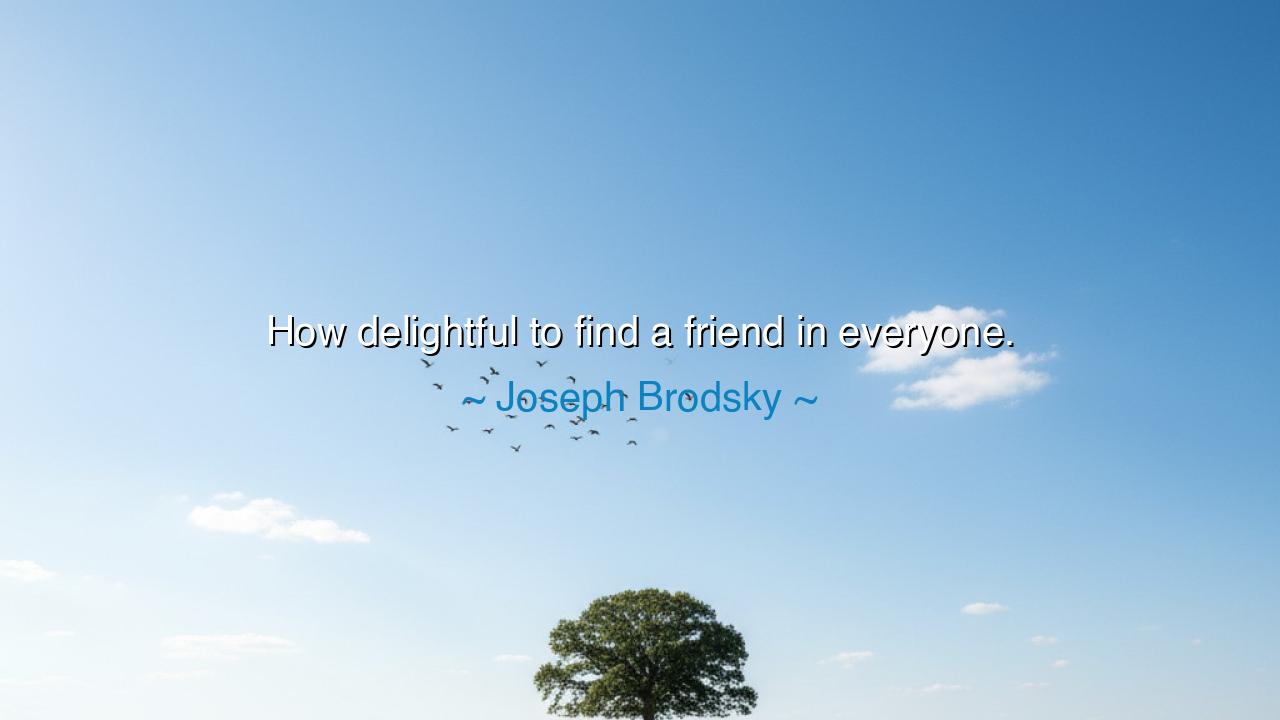
How delightful to find a friend in everyone.






"How delightful to find a friend in everyone." Thus spoke Joseph Brodsky, the exiled poet and philosopher of the soul, whose words rise from the ashes of hardship with the grace of forgiveness. In this brief yet luminous statement, Brodsky does not speak merely of social charm or shallow cheerfulness. He speaks of a vision of the heart — one so generous, so open, that it sees in every face the possibility of friendship, in every soul a mirror of its own humanity. For to “find a friend in everyone” is not the naïveté of blindness, but the courage of understanding; it is the triumph of love over suspicion, and of compassion over pride.
Brodsky was no stranger to loneliness. Born in the Soviet Union, he was condemned for “parasitism,” exiled from his homeland, and forced to rebuild his life in a foreign land. Yet from exile came wisdom: he learned that bitterness shrinks the soul, while openness enlarges it. His words are thus a declaration of freedom — not political, but spiritual. Having suffered the cruelty of division, he recognized the holiness of connection. “How delightful,” he says, not as one indulging in sentiment, but as one who has tasted despair and still chooses joy. In the eyes of Brodsky, to see a friend in everyone is the purest form of resistance against hatred itself.
To live this truth is no small task. It demands that we strip away the walls of judgment that separate “us” from “them.” It calls us to look upon the world not through fear, but through wonder. The ancients taught this long before Brodsky — that all human beings are branches of one great tree, sharing the same root. Marcus Aurelius, the philosopher-emperor, wrote: “We were born for cooperation, like feet, like hands.” When one part of humanity strikes another, it strikes itself. In friendship, the heart remembers this unity. To “find a friend in everyone,” then, is to restore the natural order of the spirit — to recognize that beneath difference, there is kinship; beneath division, harmony waiting to be found.
History offers us luminous examples of this ideal. Consider the life of Mahatma Gandhi, who sought friendship even with his oppressors. When others saw enemies, he saw souls yet untouched by understanding. To the British who imprisoned him, he wrote letters of kindness; to those who struck him, he offered peace. He did not find friends because they were good — he found friends so that they might become good. His vision was not sentimental but transcendent, grounded in the truth that friendship, freely given, is a seed of transformation. Like Brodsky, Gandhi believed that only through the eyes of friendship could humanity overcome its self-inflicted wounds.
But to “find a friend in everyone” does not mean to ignore evil or deny pain. It is not to trust blindly or surrender discernment. Rather, it is to keep the heart free from hatred — to hold faith that within even the hardest soul lies a spark of light. The wise see this spark and speak to it, even when it flickers weakly beneath layers of ignorance. This is not folly; it is strength. For anger can build no bridge, but friendship, even in small gestures, builds the road to peace. Brodsky’s delight is thus the delight of the awakened spirit — the joy of one who refuses to let cruelty extinguish kindness.
When we meet the world with such openness, something extraordinary occurs. We begin to expand, to feel a kinship that transcends self. The stranger on the road, the rival in the field, even the critic and the skeptic — all become teachers in the great classroom of life. The soul that finds a friend in everyone becomes invincible, for it no longer depends on circumstance for joy. Its happiness flows from within, sustained by compassion. And compassion, unlike pleasure or power, never diminishes by being shared; it multiplies endlessly, like light reflected in countless mirrors.
Lesson: To see the world through the eyes of friendship is to live in harmony with the divine order. The wise heart does not wait to be loved before it loves, nor to be understood before it understands. Every soul, however distant, holds the potential to be our friend — if not in word, then in spirit.
Practical action: Begin each day with a simple resolve: to look upon others as fellow travelers rather than adversaries. Offer kindness where none is expected; listen when others speak; forgive when wronged. Do not seek perfection in others, but see their humanity. In doing so, you will find — as Joseph Brodsky found — that the world itself becomes gentler, warmer, and more beautiful. For what greater delight can there be than this: to find, in every heart you meet, a reflection of friendship waiting to be awakened?






AAdministratorAdministrator
Welcome, honored guests. Please leave a comment, we will respond soon